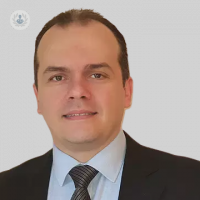Cataract surgery: your questions answered
Written in association with:Cataracts, characterised by the clouding of the eye's natural lens, are a common vision ailment, particularly among the ageing population. Cataract surgery, a highly effective and routine procedure, is often recommended to restore clear vision and improve overall eye health.
Consultant ophthalmologist and vitreoretinal surgeon, Mr Serafeim Antonakis provides the answers to your commonly asked questions about the surgery.

What is a cataract?
A cataract is a gradual clouding of the eye's lens, leading to blurred vision and, in advanced stages, visual impairment. The lens, responsible for focusing light onto the retina, may develop clumps of protein that hinder its transparency. The result is akin to looking through a foggy window, causing difficulty in everyday activities such as reading, driving, or recognising faces.
How do I know if I need cataract surgery?
Determining the need for cataract surgery involves assessing the impact of cataracts on daily life. If your vision is significantly compromised, and eyeglasses or contact lenses no longer provide sufficient improvement, it may be time to consider surgery. An ophthalmologist can assess the extent of cataract development and recommend surgery when deemed necessary.
Is cataract surgery painful?
Cataract surgery is generally considered a painless procedure. It is performed under local anaesthesia, ensuring the eye is numb and the patient remains comfortable throughout the procedure. The majority of patients report little to no discomfort during the surgery itself. Advanced surgical techniques, such as phacoemulsification, involve small incisions and contribute to quicker healing with minimal discomfort.
What are the risks associated with cataract surgery?
In some cases, the posterior capsule of the lens may cloud over time, requiring a secondary procedure. However, advancements in technology and surgical methods have significantly reduced these risks.
Cataract surgery is generally safe. However, it carries some of the following risks:
- infection
- bleeding
- inflammation
- retinal detachment
- increased intraocular pressure
- posterior capsular opacification
- corneal oedema
- droopy eyelid
It may also result in allergic reactions to anaesthesia, and some patients may be dissatisfied with the results.
Thankfully, complications are rare, and the majority of patients experience improved vision with minimal issues. It is crucial to discuss individual risks with the ophthalmologist before the procedure.
It is crucial to discuss potential complications with your ophthalmologist and to follow post-operative care instructions diligently.
How long is the recovery period for cataract surgery?
The recovery period for cataract surgery is relatively short. Most individuals experience improved vision within a few days, although full recovery may take a few weeks. During the initial days, it is common to experience mild itching, discomfort, or sensitivity to light.
Eye drops may be prescribed for infection prevention and inflammation control. Within the first week, some notice significant vision improvement, continuing over the next few weeks
Patients are advised to avoid strenuous activities and follow the prescribed eye drop regimen as recommended by the ophthalmologist. Regular follow-up appointments with the surgeon ensure proper healing and address any concerns that may arise.
Cataract surgery is generally successful, leading to improved vision and enhanced quality of life for many individuals.
If you would like to book a consultation with Mr Antonakis, simply visit his Top Doctors profile today


